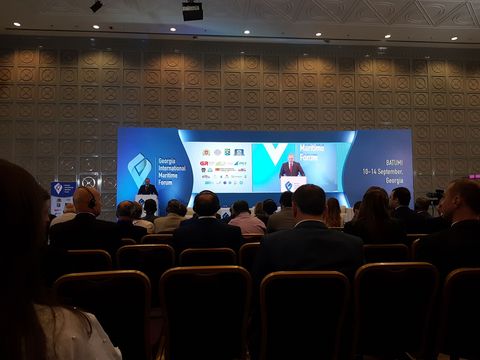Sectors & markets
Georgia International Maritime Forum

Maritime sector in Georgia.
Georgia International Forum Maritime Forum
13 September 2018
On September 2018, the CCIFG attended the Georgia International Maritime Forum in Batumi. The aim of the event was to creat awarness on the maritime sector and to stress the need for a Blue economy.
Georgia - a new hub for the maritime industry ?
Georgia has a unique geographic place and the government is putting many efforts for the country to become a real hub of activity (communication, tourism,…).
Its geographic position represents also a huge responsibility, as Georgia is the maritime gate for 8 countries.
Georgia has a joint responsibility with the other Black Sea countries to create an agenda to enhance the cooperation. In the scope of the 2018 edition of the European Maritime Day, the Black sea countries reaffirmed their commitment to work more closely with the endorsement of a Declaration towards a Common Maritime Agenda for the Black Sea. The agenda should be established by June 2019.
Georgia is classed at the 8th place in the index “Doing Business” of the World Bank showing on the international level that the country is a favourable place to conduct business. Moreover on the national level, the local government of Adjara and the Georgian government are acting together to set up privileges for companies in the maritime industry willing to work in Georgia: low taxation (maybe none), access to technologies,…
The International Maritime Organisation (IMO) pointed out that the involvement of the Georgian government is sending a strong image to the maritime sector. In particular their involvement in the modernisation of their infrastructures (Anaklia Deep Sea Port, railways and roads).
The new face of the maritime sector: Blue economy
The IMO insisted on the fact that the maritime sector needs to be modernised according to the sustainability standards. Firstly, by making a cut of 15% in the gas emission, and also through the use of new technologies like for example autonomous vessels.
One of the main issue for the maritime sector is its old and traditional image as well as the negative attention it gets. That is why the industry needs to benefit from a face lift and to find ways to remain competitive on a collaborative basis.
Education and trainings are also to be taken into account. That is why the local government of Adjara will continue to support the local education and training centres. The methods in training are also evolving. The crew for example should not be form only to the task but should also understand its meaning. The communication between management and the crew should be reinforced. Without effective training, the technology developed will not be used at its best.
Singapore's port - an example for Georgia ?
A comparison with the port of Singapore has been done. Singapore is small in term of population and superficies but its strategic location made it becomes the world largest transhipment port. Singapore is today connected to 600 other ports.
Nevertheless, a strategic location does not mean success. It relays on strategic decisions. That is why Singapore is creating a new port in the West of the island that will become the largest port in a single location with a capacity of 65 million containers. The port will overcome some issues thanks to technology by creating an intelligent environment. The geography of the port is important but the digital side has become essential to its success. That is why Singapore’s port has signed contracts with start-ups in the maritime industry to continue to innovate.
The Blue Economy: a priority of the European Union
The Blue economy represents 500 billion EUR a year so 4% of the EU’s revenues. It represents 5.4 million jobs.
The Georgian government is working with EBRD and EIB in order to prioritise the environment, the sustainability of the industry and to introduce new standards.
EBRD has invested 9.7 billion in sustainable transport: fleet renovation, port infrastructure,.. and in technical assistance. They implemented a new environmental project in 5 pilot countries: Marocco, Egypt, Turkey, Azerbaijan and Georgia. The project consists in reducing the gas emition in the port.
Ukraine is also working on an agenda with the European Union in order to define its strategy. Their integration in the development of the maritime industry is important for the government. Ukraine took with success the audit of the IMO.
Also in June 2018, a maritime administration (in the infrastructure ministry) was created. Ukraine counts 18 ports, 5 being in Crimea.


